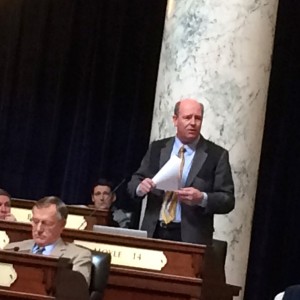(UPDATED, 3:17 p.m., to correct Rep. John McCrostie’s comment.)
After a spirited debate focused on tax policy — and its potential impacts on education funding — the House passed a far-reaching end-of-session tax overhaul bill.
As written, House Bill 311 would tack seven cents a gallon on the gas tax, eliminate the sales tax on groceries and flatten the upper end of the individual income tax rates.

Supporters say the bill would make a down payment on funding highway repairs, eliminate an onerous grocery tax and enhance the state’s economic competitiveness. Critics argue that the bill would amount to a tax increase on the working class, with wealthier Idahoans reaping the tax benefits.
Several House Democrats argued that the omnibus tax bill would undermine one of the session’s success stories, a career ladder bill that would put an additional $125 million into teacher salaries over the next five years.
If funded, the career ladder is “a great deal” for the state’s schools and teachers, said Rep. John McCrostie, a Boise Democrat and teacher. But if the state fails to fund the plan, McCrostie said he would leave the teaching profession. “There’s no reason to stick things out.”
The Idaho Center for Fiscal Policy has estimated the bill would take $50 million a year from the general fund — with the tax benefits going to wealthier Idahoans. In 2015-16, as the changes roll out, the bill is actually expected to bring in an additional $15 million into Idaho’s general fund.
House Majority Leader Mike Moyle, R-Star, said the bill protects the state’s funding commitment to the career ladder; “Idaho is not going to have more money for schools … if you don’t grow the economy.”
The bill passed 53-17. All 14 House Democrats opposed the bill, joined by three Republicans: Reps. Neil Anderson of Blackfoot, Gayle Batt of Wilder and Wendy Horman of Idaho Falls.
The bill now heads to the Senate, where its fate is uncertain. Eight Senate Republicans are signed on as co-sponsors — but no members of Senate leadership are on board, and last week, House Speaker Scott Bedke predicted the bill would be amended in the Senate.
In other Statehouse news from Monday:
Bullying. An anti-bullying bill cleared the Senate and now goes to Gov. Butch Otter’s desk.

Under House Bill 246, students or minors who engage in “harassment, intimidation or bullying” could be subject to an infraction.
The bill’s sponsor, Boise Democrat Janie Ward-Engelking, said the school environment has changed since she retired from the classroom after a 33-year career. Students face cyberbullying over social media platforms that didn’t exist a few years ago.
Opponents argued that the language on potential punishments is vague. Ward-Engelking and other supporters argued that the bill represents a first step to protect students. “We may have to come back and add a little more strength to it.”
The bill passed, 24-10. It passed the House last week.
Gubernatorial veto. Gov. Butch Otter issued his first veto of the legislative session – killing a bill that was supposed to help districts and charter schools that experience enrollment increases during the year.

Under existing law, school funding is determined using a complex calculation involving attendance levels from the first 10 weeks of the school year.
House Bill 126 would have allowed school districts to use either attendance numbers from the first 10 weeks or the end-of-term numbers, whichever is greater.
Otter vetoed it due to funding concerns. He did not budget for it in the request he delivered to lawmakers alongside his State of the State address.
“The first rule for getting out of a hole is to stop digging,” Otter wrote. “Unfortunately, despite its good intentions House Bill 126 keeps digging an estimated $1.7 million financial hole while attempting to full another.”
Some legislative budget-writers and opponents of the plan said it would lead to double-funding students, since the school the student originally attended would still receive its full funding allocation.
Otter made nearly the same argument.
“The legislation seeks to address the issue of how best to enable state funding to ‘follow the students’ who move from one school to another at various points in the academic year,” Otter wrote. “But the result of the measure actually will be double funding of some students while other funding priorities remain unmet.”
Sponsoring Rep. Judy Boyle, R-Midvale, has said the bill was necessary to help districts or charter schools that experience enrollment gains during the year so local resources aren’t spread too thin when there is an unexpected student population increase.
The alternative funding bill had cleared the House 51-19 and the Senate 32-3 earlier this month.
Otter announced the veto in a letter sent Monday to House Speaker Scott Bedke, R-Oakley.
STEM action center. The Senate Education Committee gave its go-ahead to a bill that would create an action center to focus attention on the “STEM” disciplines: science, technology, engineering and math.
House Bill 302 has a $2 million price tag attached to it — but funding is up in the air. The bill’s sponsor, Coeur d’Alene Republican Sen. Bob Nonini, said he is hoping to secure some one-time funding for the office.
The STEM action center is modeled after a similar effort in Utah — which had first-year funding of $20 million and second-year funding of $30 million.
The action center would be housed under Otter’s office, and governed by a nine-member board.
The House-passed bill now goes to the Senate floor.
School counselors. The House passed a bill that is designed to sharpen the focus on the role counselors play in preparing students to continue their education and pursue careers.
Sponsoring Rep. Julie VanOrden, R-Pingree, said the bill is necessary because counseling services were cut during the Great Recession as counselors were give others clerical and support services roles.
House Bill 313 states that counselors should “spend most of their time in direct service to and contact with students.” The bill describes activities that are appropriate for counselors and states indirect services should only take up a small amount of counselors’ time.
Although it is not a budget bill, the legislation incudes a formula that would direct $2.5 million in new state spending for counseling, should the Joint Finance-Appropriations Committee provide the funding.
The school counselor bill cleared the House 53-15. It heads next to the Senate, where it would traditionally make its first stop in the Senate Education Committee.
Federal waiver. The House also passed a bill that outlines the approach state education officials should take when drafting a new No Child Left Behind Waiver.
House Bill 314 states that State Department of Education officials should begin reviewing the Idaho Core standards in English and math. The bill also addresses federal testing requirements, stating “federal testing requirements may be used as a graduation requirement.”
Superintendent of Public Instruction Sherri Ybarra delivered an in-depth report on the waiver requirements and her meeting with the feds earlier Monday.
The waiver bill cleared the House 60-7, and heads next to the Senate. The actual waiver itself is due to the feds April 30 now that the state has received an extension.
Idaho Ed News reporter Clark Corbin contributed to this article.
